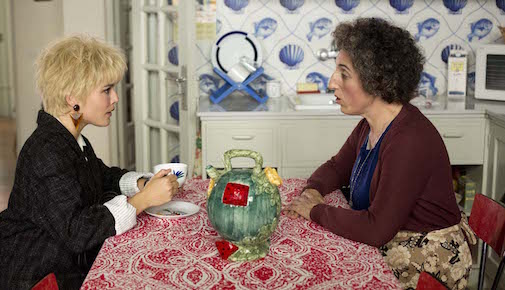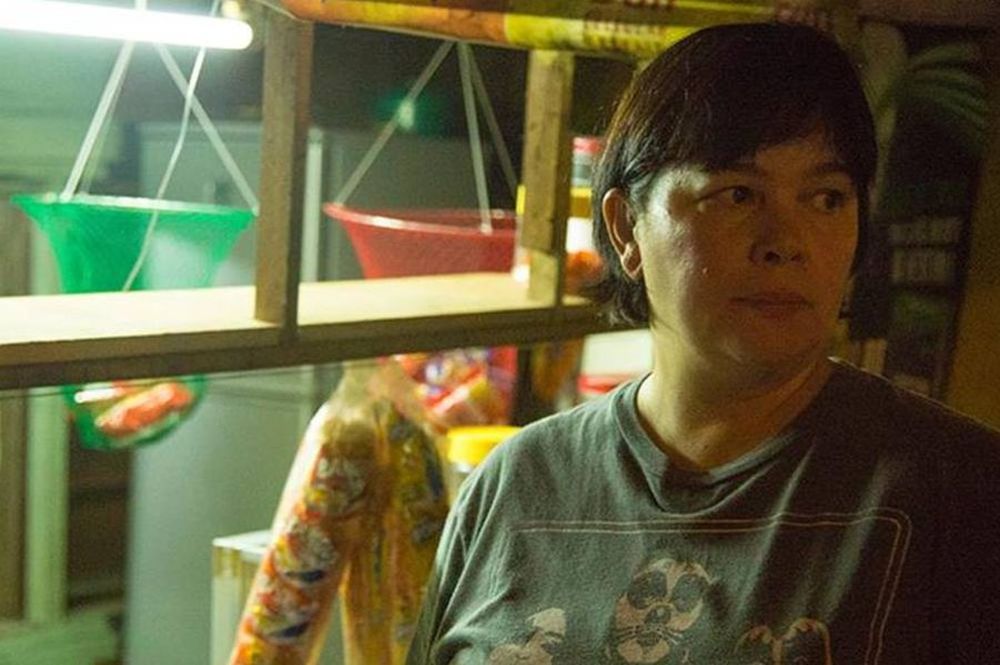
Look at this cute still from Train Driver's Diary. That's Serbia's submission to the Foreign Language Film Oscar race which was announced yesterday. It won the audience prize at the Moscow Film Festival and tells the story of a retiring train driver training his son to take over. The old man holds an infamous record: the most accidental killings on the job.
Forty-one countries have now made their announcements official including high profile choices like Chile's Neruda which stars Gael García Bernal and could put the auteur Pablo Larraín in contention for yet another nomination to whatever haul his brilliant Jackie picks up.

Spain's submission of Julieta, is even more high profile given Pedro Almodóvar's international stature...
This is only the sixth time that Spain has submitted an Almodóvar during his illustrious career. They've often picked strange times to both submit and shun their most world famous auteur since Luis Buñuel. We'll never forgive Oscar for passing on Volver (2006) in the category it should have won but at least Spain submitted it. Spain is currently in its longest dry spell ever without a nomination (12 years).

It would be a stretch to call Ma Rosa from the Philippines "high profile" but this submission is still of note for a few reasons. It's the first time The Philippines have ever submitted a film by Brillante Mendoza, one of their most lauded directors. The film took the Best Actress prize for Jaclyn Jose at Cannes. And, finally, one has to think that eventually The Philippines will receive a nomination. They've been submitting irregularly since 1953 and almost every year since 1993 without any success and they've tried everything from hit comedies, warm coming of age films, intimate character studies, historical dramas, and auteurist epics. Ma Rosa is their 28th attempt. (Even so The Philippines are not the leader in this agonizing statistic; Portugal, Romania and Egypt have all submitted 30 or more times now without a nomination)
Oscar's two favorites in this category France & Italy have yet to announce but both are less popular with voters than they once were. France is in its longest dry spell without a win (25 years). Germany, the fourth most popular country in the category historically behind those two and Spain, has vaulted to first place in the context of this new century - 5 nominations and 2 wins in the past 15 years. Statistically that's good news for Germany's Toni Erdmann and bad news for Spain's Julieta. (Not that such statistics matter in the face of viewers feelings for very specific films in specific calendar years once they're watching them. But it's interesting for trivia, general proclivities, and punditry purposes.)
 Current Predictions for the nine finalists before nominations
Current Predictions for the nine finalists before nominations
Australia, Chile, Finland, Germany, Georgia, Norway, Romania, Serbia, and Spain.
(highly subject to change with more announcements)
Submission Charts
Afghanistan to Finland - 16 submissions thus far
George to Morocco - 9 submissions thus far
Nepal to Venezuela - 15 submissions thus far
 Two high profile foreign films that were not submitted by their home countries despite international acclaim but which are hitting US theaters...
Two high profile foreign films that were not submitted by their home countries despite international acclaim but which are hitting US theaters...
Brazil's Aquarius (starring Sonia Braga) has won nothing but raves abroad but has had political trouble with the new region at home opens October 14th. Meanwhile South Korea didn't risk submitting the outre double-crossing period sex epic The Handmaiden which opens October 21st. That's a shame becaues it is wholly amazing. You must see it in theaters. In a just world the Academy would shower it with craft love.
 Official submissions that played or will play theatrically in the US in 2016
Official submissions that played or will play theatrically in the US in 2016
Venezuela's From Afar (June 8th), Australia's Tanna (Sept 16th), Sweden's A Man Called Ove (Sept 30th), Chile's Neruda (Dec 16th), Spain's Julieta (Dec 21st), Germany's Toni Erdmann (Dec 25th). Sadly not as many as usual. No submissions are yet scheduled to hit US theaters in the first quarter of 2017 but at least a few films each year try that route, banking on a nomination which may or may not come.